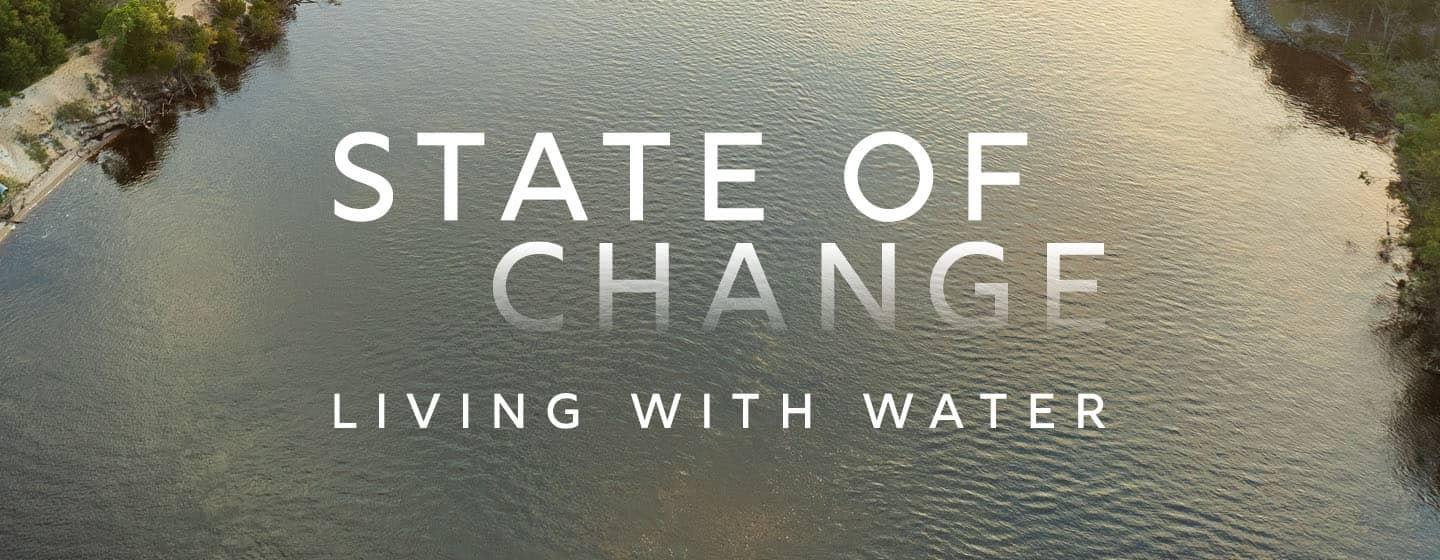PBS North Carolina Announces New Installment of Climate Change Series 'State of Change'


FOR IMMEDIATE RELEASE
RESEARCH TRIANGLE PARK, NC, 3/31/2025 — PBS North Carolina announces State of Change: Living with Water, a new half-hour program that looks at how communities in North Carolina have increased their resilience to climate change by returning waterways to a natural state. It premieres Thursday, April 17, 8:30 PM, on PBS NC, online and on the free PBS app.
“All three stories in State of Change: Living with Water highlight how North Carolinians are finding solutions that work with nature to create more resilience to climate change,” said Michelle Lotker, the program’sexecutive producer. “For many people, a favorite river, lake or beach feels like home. As these places feel the effects of our changing climate, how do we adapt so we can continue to work, live and play around the water systems in our state?”
Stories featured in State of Change: Living with Water include how the Coharie Indian Tribe is reconnecting with the river they’ve lived on for centuries, how the Battleship North Carolina modified its marshy surroundings to adapt to rising sea levels and how Conserving Carolina is working to restore floodplains in western North Carolina.
On Tuesday, April 22, at 7 PM, PBS North Carolina will host a free screening of State of Change: Living with Water at the North Carolina Museum of Natural Sciences in Raleigh and online. Part of the North Carolina Science Festival, the screening will also include a panel discussion moderated by Michelle Lotker. For more information on the event and to RSVP, visit Eventbrite.
State of Change: Living with Water is the fifth installment of PBS North Carolina’s climate changeseries. It is part of the Pulitzer Center’s Connected Coastlines, a nationwide climate reporting initiative in coastal states.
“PBS North Carolina appreciates the generous support of the Pulitzer Center, which allows us to tell thoughtful stories about people who are making a positive impact and share them with the whole state and beyond,” said Lotker.
In addition to the broadcast special, stories from the series will be shared on PBS North Carolina’s website and YouTube channel. On the website, digital shorts will be accompanied by three long-form blog articles about the people and organizations featured this season.
“The Pulitzer Center takes pride in supporting State of Change’s impactful storytelling,” says Steve Sapienza, Senior Editor, U.S. News Partnerships, at the Pulitzer Center. “The series stands out within our Connected Coastlines initiative, delivering locally driven, well-researched reporting that artfully explains the science behind climate solutions. We applaud the producers of the series for being selected to share valuable insights from this reporting with the public at the North Carolina Science Festival.”
The Coharie Indian Tribe: Returning to the River
Storms and beaver overpopulation have blocked the Great Coharie River, making it unnavigable. But the Coharie Indian Tribe is restoring their namesake river and introducing it to the next generation, who grew up without it. The restoration project is reconnecting them to their heritage and preparing them to steward the river as climate change reshapes the surrounding landscape.
Battleship North Carolina: Living with the Tide
Tidal flooding around the Battleship North Carolina has skyrocketed 7,000% since it arrived in Wilmington in 1961, restricting visitor access. But visitor revenue is crucial to its survival. To stay afloat, leaders restored natural systems around the ship. This Living with Water project isn’t just saving a historic landmark, it’s a model for how coastal communities can face climate change head-on.
The French Broad River: Fixing the Floodplains
Floodplains along the French Broad River naturally soak up stormwater and provide a home for wildlife. But over time, ditches and berms have changed the land, separating the floodplain from the river. Now, Conserving Carolina is working to bring these floodplains back to life—helping people, wildlife and prized fish like the muskie thrive.
Connected Coastlines is a nationwide climate reporting initiative in the U.S. coastal states. The initiative is building a consortium of newsrooms and independent journalists across America to report on the local effects of erratic weather patterns on coastal populations using the latest climate science. Since launching the initiative in 2019, the Pulitzer Center has helped launch 53reporting projects in 20 states with over 75 journalism partners. Learn more about the Pulitzer Center at pulitzercenter.org.
As North Carolina’s statewide PBS network serving the country’s third largest public media market, PBS North Carolina educates, informs, entertains and inspires its audience on air, online and in person. Through its unique partnership of public investment and private support, the network includes in-person engagement, digital-first social and online content delivery and four over-the-air channels: PBS NC, the North Carolina Channel, Rootle 24/7 PBS KIDS channel and the Explorer Channel. Its transformational events and content spark curiosity and wonder for all North Carolinians. Additionally, PBS North Carolina serves as the backbone for North Carolina’s state emergency services. To learn more about PBS North Carolina, visit pbsnc.org or follow us on Facebook, Instagram and LinkedIn.
-PBS NC-
Media Contact
Allyson Meade, Marketing & Communications
PBS North Carolina
press@pbsnc.org